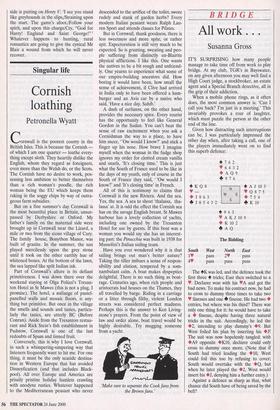Singular life
Cornish loathing
Petronella Wyatt
Cornwall is the poorest county in the British Isles. This is because the Cornish of which I am one quarter — loathe every- thing except sloth. They heartily dislike the English, whom they regard as foreigners, even more than the Welsh do, or the Scots. The Cornish have no desire to work, pos- sessing less ambition to better themselves than a rich woman's poodle, the rich woman being the EU which keeps them raking in the soggy chips by way of outra- geous farm subsidies.
But on a fine summer's day Cornwall is the most beautiful place in Britain, unsur- passed by Derbyshire or Oxford. My father's family on the maternal side were brought up in Cornwall near the Lizard, a mile or two from the stone village of Cury. The family house, Bonython Manor, was built of granite. In the summer, the sun played mercilessly upon the grey stone until it took on the other earthly hue of whitened bones. At the bottom of the lawn, the sea lapped like spilt Indian ink.
Part of Cornwall's allure is its defiant primitiveness. I was down there over the weekend staying at Olga Polizzi's Tresan- ton Hotel in St Mawes (this is not a plug, I promise). The hotel, a mélange of pastel- panelled walls and mosaic floors, is any- thing but primitive. But once in the village the smells and sounds and tastes, particu- larly the tastes, are utterly BC (Before Conran). Aside from the Tresanton restau- rant and Rick Stein's fish establishment in Padstow, Cornwall is one of the last redoubts of Spam and tinned fruit.
Conversely, this is why I love Cornwall, in such a whimpering-simpering way that listeners frequently want to hit me. For one thing, it must be the only seaside destina- tion in Western Europe that has avoided Disneyfication (and that includes Black- pool). All over Europe and America are prissily pristine holiday hamlets crawling with anodyne rustics. Whatever happened to the Mediterranean peasant who never descended to the artifice of the toilet, swore rudely and stank of garden herbs? Every modem Italian peasant wears Ralph Lau- ren Sport and attends classes for Pilates.
But in Cornwall, thank goodness, there is less sweetness and more spite, or rather spit. Expectoration is still very much to be expected. So is grunting, sweating and peo- ple suffering from distinctly un-Blairite physical afflictions. I like this. One wants the natives to be a bit rough and unfriend- ly. One yearns to experience what some of our empire-building ancestors did. How boring it would have been, how small the sense of achievement, if Clive had arrived in India only to have been offered a ham- burger and an Avis car by a native who said, 'Have a nice day, Sahib.'
A dash of surliness, on the other hand, provides the necessary spice. Every tourist has the opportunity to feel like General Gordon in the Sudan. You can't beat the sense of raw excitement when you ask a Cornishman the way to a place, to have him sneer, "Ow would I know?' and stick a finger up his nose. How brave I imagine myself when the woman in the fudge shop ignores my order for clotted cream vanilla and snarls, 'It's closing time.' This is just what the South of France used to be like in the days of my youth, only of course in the South of France they said, "Ow would I know?' and 'It's closing time' in French.
All of this is testimony to claims that Cornwall is the new Riviera. And the sea. Yes, the sea. A sea to shout `thalassa, tha- lassa' at. It is odd the effect the Cornish sea has on the savage English breast. St Mawes harbour has a lovely collection of yachts, including one owned by the Tresanton Hotel for use by guests. If this boat was a woman you would say she has an interest- ing past: the Pinucchia was built in 1938 for Mussolini's Italian sailing team.
Have you ever wondered why it is that sailing brings out man's better nature? Taking the tiller imbues a sense of respon- sibility and elation, tempered by a som- nambulant calm. A boat makes dyspeptics delightful. There is no such thing as boat- rage. Centuries ago, when rich people and aristocrats had houses on the Thames, they all travelled by barge. Riding in a carriage or a litter through filthy, violent London streets was considered perfect madness. Perhaps this is the answer to Ken Living- stone's prayers. From the point of view of law and order alone, boat travel would be highly desirable. Try mugging someone from a yacht.
Make sure to separate the Cook fans from the Brown fans.'


































































 Previous page
Previous page